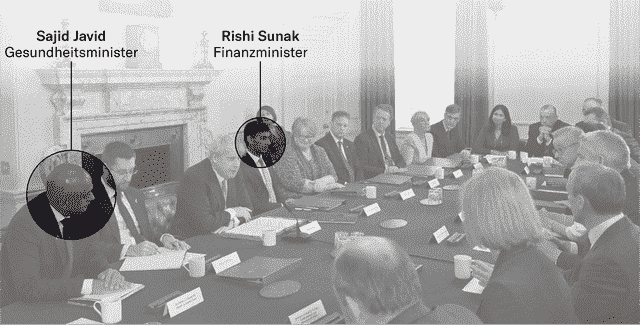The latest developments
British Prime Minister Boris Johnson is under pressure because of numerous scandals. After the resignation of several ministers, state secretaries and members of parliament, his political future hangs by a thread. The most important answers to the government crisis.
A rough wind is currently blowing against British Prime Minister Boris Johnson.
The latest developments:
- During a questioning before the so-called Liaison Committee in the House of Commons on Wednesday (July 6th), Prime Minister Boris Johnson had to face critical questions from members of the opposition and his own party. The poll, dubbed “grilling,” addressed several critical issues, including Johnson’s ability to lead a functioning government, misdecisions in appointments and false testimonies before Parliament. At the hearing, Johnson repeatedly refused to answer questions about the many resignations in his administration.
- Despite harsh criticism from within his own ranks, British Prime Minister Boris Johnson is making no move to resign. The task of every prime minister who has received a strong mandate is to continue, Johnson said on Wednesday (6 July) at the start of the traditional questioning of the head of government in parliament. However, Johnson again apologized for giving his fellow party member Chris Pincher an important parliamentary office, even though he was aware of allegations of sexual harassment.
- After the resignation of two important ministers, Prime Minister Johnson also lost 14 state secretaries, the attorney general and various trade officers. The politicians announced their resignations late Tuesday evening and later on Wednesday (July 6th). According to various media reports, one of the Prime Minister’s closest allies, Michael Gove, the Secretary of State for Housing, Communities and Local Government, has threatened to resign unless Boris Johnson resigns of his own accord.
- Accompanied by sharp criticism of Johnson, Health Minister Sajid Javid and just minutes later Finance Minister Rishi Sunak had already announced on Tuesday (5 July). resigned their offices. Both targeted the 58-year-old’s leadership style. The Advocate General for England and Wales, Alex Chalk, also announced his resignation on Tuesday evening.
- Calls for a new no-confidence vote against Boris Johnson are growing louder. This is currently not possible, as Johnson only just survived a vote of no confidence in June and he now enjoys twelve months of immunity under Tory party rules. But that could change if the so-called 1922 Committee approves a rule change on Wednesday evening (July 6), which would make a second vote of no confidence possible. To do this, a simple majority of all Conservative MPs would have to declare their distrust in the prime minister in a letter. Alternatively, a new composition of the committee could be decided upon. Should Johnson’s opponents gain the upper hand in the election, a rule change would be more likely.
What happened?
Britain is in a government crisis. Amidst sharp criticism of Prime Minister Boris Johnson, Finance Minister Rishi Sunak and Health Minister Sajid Javid resigned on July 5. Javid wrote in his letter of resignation that he had lost confidence in the head of government. The Conservative Party under Johnson’s leadership is not viewed by the public as value-led, nor does it serve the national interest. Even after the party’s vote of no confidence, which Johnson narrowly won recently, the Prime Minister did not initiate a change of course.
Finance Minister Sunak stressed that he had been loyal to Johnson. “But the public rightly expects the government to act correctly, competently and seriously.”
About the report: Boris Johnson has his back against the wall: his health and finance ministers are resigning under protest
After Sunak and Javid, other ministers and MPs have resigned. Among them Will Quince, Secretary of State for Children and Families, Robin Walker, Secretary of State for School Standards, John Glen, Secretary of State for Economic Affairs, Victoria Atkins, Secretary of Justice, Jo Churchill, Secretary of State for the Environment, Stuart Andrew, Secretary of State for Housing, Kemi Badenoch, Secretary of State for Gender Equality, Julia Lopez, Secretary of State for Digital Infrastructure, Mims Davies, Secretary of Labor, Lee Rowley, Secretary of Industry, Neil O’Brien, Secretary of State for Regional Development, Alex Burghart, Secretary of Education, Rachel Maclean, Secretary of the Interior and Mike Freer, Secretary of Exports. Tories’ Deputy Leader Bim Afolami, Advocate-General for England and Wales Alex Chalk, 14 parliamentary secretaries and two trade envoys have also tendered their resignations.
What do the resignations mean for Prime Minister Boris Johnson?
Boris Johnson made it clear he would fight. Within a few hours, he appointed two successors to the resigning ministers: Chief of Staff Steve Barclay will become Health Minister, Education Minister Nadhim Zahawi will move to the important Treasury Department and will in turn be replaced by his Secretary of State, Michelle Donelan.
But observers doubt that Johnson can hold out for long. So far, the prime minister has benefited from the fact that no successor was available. But the ministers Sunak and Javid are political heavyweights who could now position themselves after their resignations.
What are the reasons for the current government crisis?
The trigger for the political quake was Johnson’s decision to heave the Conservative MP Chris Pincher into an important parliamentary group office by making him Deputy Parliamentary Secretary of the Conservative party group. This is despite Johnson being aware of sexual harassment allegations against Pincher. Pincher eventually resigned for drunkenly groping two men. It became known that there had been similar allegations against him in the past and Johnson apparently knew about them.
A government spokesman initially denied that Johnson was aware of the old allegations against Pincher. The Prime Minister then apologized, but was unable to stop the wave of resignations.
Pincher is the latest in a series of recent scandals involving the Johnson administration. In June, Johnson narrowly survived an internal party vote of no confidence over the so-called Partygate affair. It was about alcohol-fuelled celebrations at the seat of government in Downing Street during the corona lockdown. Johnson was fined for attending a party.
In mid-May, a member of parliament from the ruling party was temporarily arrested on suspicion of rape. In the same month, a former Tory MP was sentenced to a year and a half in prison for sexually abusing a minor. In April, a member of parliament resigned for watching pornographic films on his mobile phone in parliament.
How is the public reacting to the government crisis?
The British press sees the end of Prime Minister Boris Johnson’s term in office. The Guardian wrote on July 6: “Britain deserves better than a prime minister who has become a laughingstock, leading a taxless government in a time of economic crisis.” The Times also called on Johnson to resign. There is no chance that the Prime Minister can regain his authority. Every day he stays in office increases the chaos. The Telegraph ruled that Johnson’s future was hanging by a thread.
How could Boris Johnson be forced out of office?
The following scenarios are conceivable:
- New vote of no confidence: According to the rules of the conservative faction, a second vote of no confidence is only possible after twelve months, i.e. not again until June 2023. But that could change if the so-called 1922 Committee approves a rule change on Wednesday evening (July 6), which would make a second vote of no confidence possible. To do this, a simple majority of all Conservative MPs would have to declare their distrust in the prime minister in a letter. A second vote of no confidence could take place before the summer break. Alternatively, a new composition of the committee could be decided upon. Should Johnson’s opponents gain the upper hand in the election, a rule change would be more likely. In this case, a second vote of no confidence would probably only be possible after the summer break in September.
- Johnson is forced to resign: Several other cabinet members could resign. At some point, Johnson would have no choice but to resign. According to media reports, however, this scenario is currently not very realistic, since several high-ranking ministers apparently intend to remain in office.
- Johnson resigns of his own accord: Boris Johnson could see he has lost the support of too many members of his party and cabinet and step down as prime minister.
With agency material.


